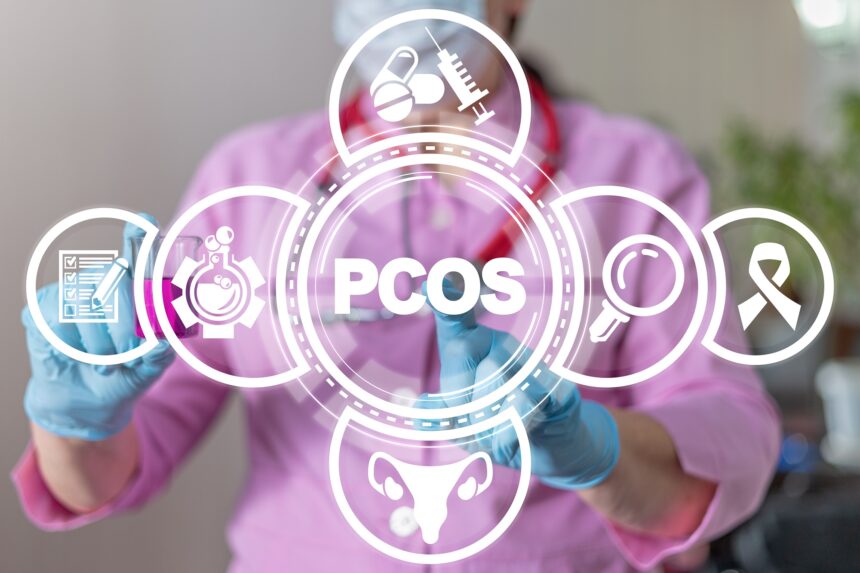Polycystic Ovary Syndrome is a complex hormonal and metabolic condition that primarily affects women of reproductive age. It consists of a combination of insulin resistance, high amounts of androgens (male hormones) produced by the ovaries, and an imbalance of other reproductive hormones such as luteinizing hormone (LH) and follicle-stimulating hormone (FSH). This hormonal imbalance inhibits the ovaries from consistently releasing eggs, resulting in irregular or skipped periods, trouble conceiving, and the formation of tiny cysts on the ovaries. Women with PCOS may experience irregular or prolonged menstrual cycles, The ovaries may produce several little collections of fluid (follicles) while failing to release eggs regularly.
Causes
While the exact cause is unknown, researchers have found numerous pathways that contribute to the development of PCOS. Here are some causes of PCOS;
- Insulin resistance: Insulin resistance plays a key role in PCOS. Women with PCOS have a higher risk of developing insulin resistance, which leads to higher levels of insulin (hyperinsulinemia). High insulin levels can contribute to increased androgen production by the ovaries, leading to hormone imbalance.
- Genetics: PCOS tends to run in families, suggesting a genetic component. Specific gene variations may make some women more susceptible to developing PCOS by affecting hormone regulation, insulin resistance, or ovarian function.
- Excess androgen levels: Women with PCOS often have elevated levels of androgens (male hormones like testosterone). This can be due to increased production by the ovaries or adrenal glands, or decreased breakdown and clearance of these hormones.
- Obesity and weight gain: Obesity, especially abdominal obesity, is closely linked to PCOS. Excess weight can worsen insulin resistance and contribute to higher androgen levels, exacerbating PCOS symptoms.
- Inflammation: Some research suggests that chronic low-grade inflammation may play a role in developing PCOS. This inflammation can contribute to insulin resistance and hormonal imbalances.
- Lifestyle factors: A sedentary lifestyle, poor diet, and stress can contribute to weight gain, insulin resistance, and hormonal imbalances, potentially increasing the risk of PCOS or exacerbating its symptoms.
MUST READ; 7 Myths about Exercise
PCOS is a complicated disorder caused by many genetic, hormonal, metabolic, and environmental variables. The way these variables interact differs from person to person, which adds to the variety in PCOS presentations and symptoms.
Symptoms;
Here are some common symptoms of PCOS
- Irregular or absent menstrual periods: This is one of the most prevalent symptoms of PCOS. Women with PCOS may experience infrequent, irregular, or prolonged menstrual cycles, or even complete absence of periods (amenorrhea).
- Excessive androgen levels: High levels of male hormones, known as androgens, can cause symptoms such as Hirsutism (excessive hair growth on the face, chest, abdomen, or back) Acne, and Male-pattern baldness or thinning hair.
- Ovulation problems: PCOS is a leading cause of anovulatory infertility, where ovulation (the release of an egg from the ovary) does not occur regularly or at all.
- Weight gain: Many women with PCOS struggle with weight gain, especially around the abdomen. Insulin resistance, common in PCOS, can contribute to this weight gain.
- Sleep apnea: Women with PCOS are at an increased risk of developing sleep apnea, a condition characterized by interrupted breathing during sleep.
- Mood disorders: PCOS has been linked to an increased risk of depression, anxiety, and other mood disorders, potentially due to hormonal imbalances.
- Skin changes: In addition to acne, some women with PCOS may experience thickening and darkening of the skin (acanthosis nigricans) or skin tags.
It’s important to note that not all women with PCOS will experience all of these symptoms, and the severity of symptoms can vary from person to person. Some women may have PCOS but remain asymptomatic, while others may experience a combination of several symptoms.
Treatment Options;
Polycystic Ovary Syndrome (PCOS) has numerous treatment options available that try to manage symptoms while also addressing underlying causes. The treatment options are usually tailored to the individual’s personal needs and goals, such as controlling menstrual cycles, increasing fertility, or managing metabolic disorders. Here are some popular treatments for PCOS:
- Lifestyle changes: Weight loss through a balanced diet and regular exercise. Maintaining a healthy body weight can help improve insulin sensitivity and reduce androgen levels.
- Medications: Combined oral contraceptives (birth control pills) can help regulate menstrual cycles and reduce androgen levels.
- Hair removal treatments: For excessive hair growth (hirsutism), options include electrolysis, laser hair removal, or topical creams like eflornithine.
- Surgical interventions: Ovarian drilling (also known as ovarian diathermy) may be recommended in some cases to induce ovulation.
- Stress management: Techniques like yoga, meditation, or counseling can help manage stress, which can exacerbate PCOS symptoms.
In conclusion, The diagnosis of Polycystic Ovary Syndrome (PCOS) involves a comprehensive evaluation including a detailed medical history, physical examination, and various tests. Blood tests check hormone levels like androgens, luteinizing hormone, follicle-stimulating hormone, prolactin, and insulin resistance, while a pelvic ultrasound looks for the presence of multiple small ovarian cysts. The diagnosis is typically made using the Rotterdam Criteria, which require at least two of the following three features: irregular or absent ovulation, clinical or biochemical signs of excess male hormones, and polycystic ovaries on ultrasound. Early diagnosis and comprehensive management are crucial to preventing the long-term health consequences of PCOS and improving the overall well-being of affected women.


